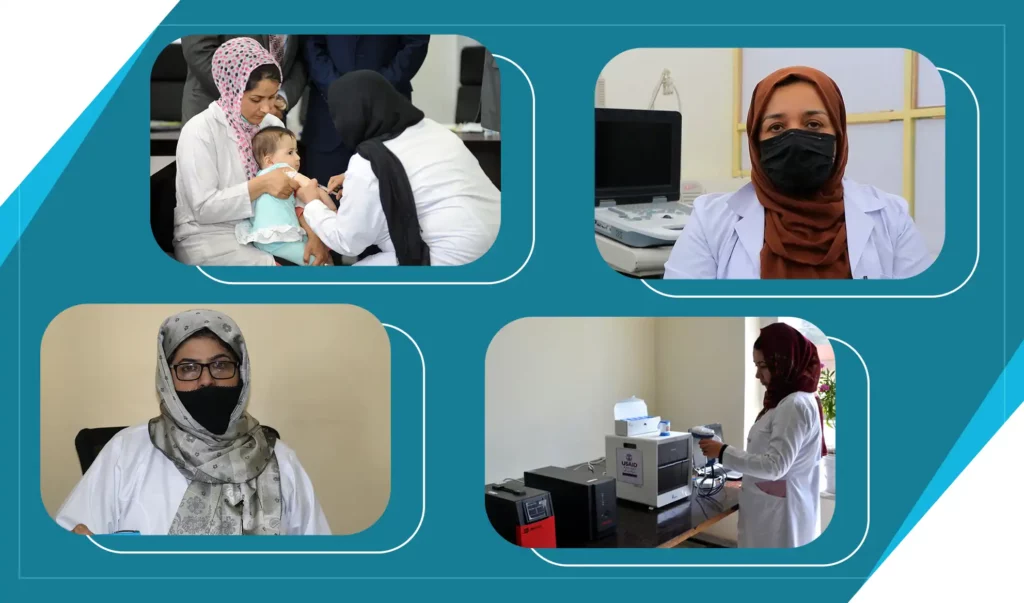(MENAFN- Pajhwok Afghan News)
KABUL (Pajhwok): We encountered no changes or problems in our working practices during the past two years following the regime change, but not allowing girls and women to continue their education and public sector jobs may lead to a tragedy in future, some female doctors and nurses said on Monday.
The health practitioners consider restrictions on work and education of females 'unjustifiable' and a huge blow to all sectors especially health.
Doctress Shinkai Wardak, a maternity health provider and a member of the Maternity Doctresses' Union of Kabul city, told Pajhwok Afghan News after the political change in the country on August 15 2021, all female officials of majority of government offices were confined to their houses and girls were barred from going to schools and universities, but no significant changes took place in the work of female health practitioners.
Wardak added:“We do not feel much change in our profession with the political change in the country”.
No change has appeared in the private health sector as well, but the postponement of the specialization exam for doctors and the closure of universities could cause serious decrease in the number of health workers in the future, she added.
“We face serious decrease in health personnel, such decrease is felt even in huge hospitals as well, because majority of the doctors have left for foreign countries and doctors who graduated recently cannot replace the experienced doctors,” she added.
Doctress Shinkai said the security had improved a lot after the political change in the country, but continued restrictions on girls education was a matter of concern which could lead to a tragedy in the future.
“As a female and a mother I request the government not to think the women are weak, they hare half of the society, we do not want to be only in health sector, we want women to appear in every body of the government, we want girls to be allowed to study as well”, Shinkai demanded.
Meanwhile, Jamila Ahmadi, a nurse at a private hospital in Kabul city, said they faced no restrictions or change to their work.
Jamila added:“We did not face any particular change in the health sector, we work as before, we don't have any problems in commuting as well.”
Jamila was also concerned about the closure of schools and universities for girls and urged the government to reopen educational institutions for females.
Doctor Malalai Rahim Faizi, the director of Malalai Maternity hospital, told Pajhwok, no changes had appeared in their working field with the change of regime.
Faizi said:“We work in shifts like we did in the past, right now we provide the same sort of services, no particular changes have appeared in our working regime. All doctresses and nurses observe hijab and wear our scarf as in the past, right now we wear the same clothing (hijab, scarf) and we use our transport services, the only change that appeared is that right now we use longer hijab, but we wear our professional uniform inside the hospital”.
She added services at their hospital had improved compared to the past and laser operations were also conducted in the hospital right now. She said services in all departments of the hospital had improved.
She added:“The main problem we had in the past was lack of trainer doctors, right now all trainer doctors are present. All the changes that took place in the hospital were positive changes, I have never witnessed negative changes, everything changed for the better during the past two years after the political change”.
Faizi also thinks restrictions on education of girls are unjustifiable and said:“I request the government of Islamic Emirate as a female doctor to open the doors of education for girls”.
Hafiz Ziaullah Hashimi, the spokesman of the Ministry of Higher Education, told Pajhwok:“The decree that banned education of girls is until further order, we all are obliged to obey the decree, asking again and again about this issue is the waste of time”.
But according to a report, Interior Minister Sirajuddin Haqqani during his trip to Herat province on July 4th said that efforts were underway to find a solution to reopening of educational institutions for girls.
Also Sher Mohammad Abbas Stanikzai, deputy foreign minister for political affairs, had previously said no one has a religious reason to oppose the education of girls and all scholars of Afghanistan agreed that education must be provided to girls.
Stanikzai added:“As I have said several times and now I clearly say that education is mandatory for both males and females, scholars are present now, no one can reject the obligation of education, education is an absolute obligation of both male and female, the government must open the doors of all of the schools and seminaries for all”.
aw/ma
Hits: 25




















Comments
No comment